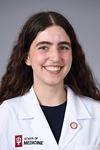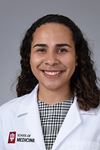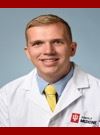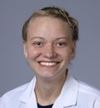MS1
-
Wade Catt
 Undergraduate Institution: Indiana University Purdue University Indianapolis
Undergraduate Institution: Indiana University Purdue University IndianapolisResearch: As an undergraduate, I researched in Indianapolis and Ecuador on medical anthropological topics such as medical pluralism, demographic transition, and explanatory frameworks of chronic illness. I have also worked as a research coordinator on an NIEHS-funded interdisciplinary project through Purdue University on volatile organic compound exposure in a rural Indiana town. These experiences fostered a desire to perform rigorous scholarship in social science and medicine in a mutually informative way. However, I hope to focus and apply my research to topics such as gerontology and Alzheimer’s Disease and Related Dementias (ADRD).
-
Arianna Harris-Kawano
 Undergraduate Institution: Hanover College
Undergraduate Institution: Hanover College Research: My undergraduate research involved validation of a transgenic zebrafish model for tissue-specific induction of proinflammatory cytokines in pancreatic beta cells. Since graduating college in 2022, I have continued to take part in research focused on beta cell dysfunction in the context of Type 1 Diabetes. Over the past year, I have been involved in projects investigating several potential biomarkers of T1D. Generally, I am interested in studying the underlying mechanisms that contribute to beta-cell dysfunction in pediatric patients with Type 1 and Type 2 Diabetes. I hope to apply these interests toward contributing to the overall understanding of diabetes so that we may find ways to mitigate the adversity disadvantaged populations face when trying to manage this disease.
-
Mo Kleinhenz
 Undergraduate Institution: Washington University in St. Louis
Undergraduate Institution: Washington University in St. Louis Research: As an undergraduate, I worked on two clinical studies – investigating the impacts of limb-restraint therapy in children with cerebral palsy on somatosensory processing and helping to create a quality-of-life scale specific to GNAO1 encephalopathy. Following my undergraduate education, I studied the immune response against S. aureus infections in children, focusing on understanding the mechanisms of protective immunity against recurrent infection. Broadly, I am interested in combining my research interests in neuroscience and immunology to study the role of the neuroimmune response in neurodegenerative diseases.
-
Loren Lavadia
 Undergraduate Institution: University of California San Diego
Undergraduate Institution: University of California San Diego Research: My research has focused on neuropsychiatric disorders and neurological diseases, from pre-clinical to clinical levels of investigation. During my undergraduate years, I completed projects on the underlying neurobiological mechanisms of seasonally induced bipolar disorder on mice models. In addition, I was also involved in another project that examines the neuropsychological and neurophysiological effects of pro-cognitive drugs in patients with schizophrenia using experimental medicine paradigms. After UCSD, I transitioned to Massachusetts General Hospital (MGH), where my clinical research concentrated on sleep abnormalities and circadian dysregulation in patients with Parkinson’s Disease and its prodrome, REM Sleep Behavior Disorder. I also experienced conducting multisite national clinical trials and international observational and longitudinal research studies at MGH. As a future physician-scientist, I hope to conduct research on the translational neuroscience of sleep abnormalities in relation to psychiatric disorders and neurodegenerative diseases.
-
Katherine Lipsius
 Undergraduate Institution: University of Maryland Eastern Shore
Undergraduate Institution: University of Maryland Eastern Shore
Research: As an undergraduate, I worked in multiple labs dedicated to the environmental influences on health, the information that could be discovered about solute transport, and diabetes using the Zebrafish and organic solutions to pest control. After graduating I spent three years as a Post-baccalaureate Mishoe Fellow at the NHLBI/NIH where my work shifted to the study of the crosstalk and development of the sympathetic nervous system and the vascular system in mice. I am interested in continuing work with integrative clinical neuroscience and the crosstalk between the nervous system and other biological systems.
-
Carl Russell III
 Undergraduate Institution: Purdue University
Undergraduate Institution: Purdue UniversityResearch: My undergraduate research explored the biomechanics of and manufacturing interventions for impact sports, mobile healthcare interventions for patients with chronic kidney disease, and implantable biosensor development in adhesive hydrogels and antifouling mechanisms. My research interests lie in nephrology interventions in mobile healthcare interventions, dialysis devices, and acute kidney injury therapeutics. As a prospective physician-scientist, I aim to positively impact renal patients by developing my research, engineering, and medicine skills.
-
Alejandro Soto
 Undergraduate Institution: Indiana University Purdue University Indianapolis
Undergraduate Institution: Indiana University Purdue University Indianapolis Research: My undergraduate research focused on elucidating the underlying mechanisms and risk factors, such as the apolipoprotein E genotype, contributing to long-term neurocognitive impairments in children with severe forms of plasmodium falciparum malaria. This led me to focus on determining potential reliable, non-invasive prognostic biomarkers of acute brain injury within the context of Ugandan children with severe malaria. In parallel, I have also worked with a zebrafish model of fetal alcohol spectrum disorder, centered on determining the rescuing effects of folic acid and retinoic acid following embryonic ethanol exposure. Broadly, I am interested in continuing research within global health and infectious disease, focusing on understanding the mechanisms involved in clinical neurological manifestations and brain injury. I hope to become a physician-scientist who will develop therapeutics and interventions to enhance patients’ lives globally.
MS2
-
Eli Hagedorn
 Undergraduate Institution: The University of Alabama
Undergraduate Institution: The University of Alabama
Research: As an undergraduate researcher, I compared the antiviral responses of young and aged individuals using Drosophila melanogaster. My thesis work and clinical experiences also cultivated my interests in the mechanisms of metabolism and diabetes. I am broadly interested in the interaction between metabolism, the immune system, and the aging process. I hope to integrate these interests to improve the understanding and treatment of autoimmunity, diabetes, and biological aging.
-
Benjamin Johnson
 Undergraduate Institution: Brigham Young University
Undergraduate Institution: Brigham Young University
Research: I worked with a tissue engineering group as an undergraduate to create an improved lung disease model. Due to this experience and my previous research rotations, I am excited about using tissue engineering and novel biomaterials to treat disease and regenerate organs. I also worked in an entrepreneurship team attempting to bring less expensive insulin to the market. My experiences drive me to pursue research grounded in patients' experiences while looking toward translation.
-
Kali Konstantinopoulos
 Undergraduate Institution: Indiana University
Undergraduate Institution: Indiana UniversityResearch: My undergraduate research centered on collective cell dynamics and cell-environment interactions in breast and colorectal cancer. I have also developed software for simulating cell shape, mechanics, and adhesion. As an aspiring physician-scientist, I am interested in applying computational tools to study disease progression and treatment, working towards precision medicine based on individual patients’ disease patterns and data.
-
Alexander Kritikos
 Undergraduate Institution: Case Western Reserve University
Undergraduate Institution: Case Western Reserve UniversityResearch: As an undergraduate, my research was focused on understanding the role of iron in the pathogenesis of glaucoma, age related macular degeneration, and Alzheimer’s disease, and the relationship between the diseases. Now, I am broadly interested in studying the pathogenesis and molecular mechanisms of diseases, especially those that significantly affect patient quality of life, including cancers and ocular disorders. I am particularly interested in using microscopy and other imaging methods to study the pathology of these diseases.
-
Hannah Rondon
 Undergraduate Institution: Purdue University
Undergraduate Institution: Purdue University
Research: With a background in Neurobiology and Biochemistry, I am extremely interested in studying neurodegenerative diseases from a biochemical standpoint. Previously my research focused on studying the implication of the dysregulation of human deubiquitinate enzymes in neurodegenerative diseases and cancer. As a future physician-scientist, I hope to contribute to our understanding of the molecular mechanisms underlying neurodegeneration and advance our therapeutic strategies for neurologic disease.
-
Cameron Rostron
 Undergraduate Institution: University of Kentucky
Undergraduate Institution: University of Kentucky Research: I was very fortunate to have amazing undergraduate research opportunities studying sex differences in circadian rhythms and metabolism, as well as tobacco use and control among college students. During the MSTP program, I hope to study the biology of pancreatic β-cells and the autoimmune response that causes Type I Diabetes to better understand, prevent, and treat this disease.
-
Selena Wang
 Undergraduate Institution: University of Illinois at Urbana-Champaign (UIUC)
Undergraduate Institution: University of Illinois at Urbana-Champaign (UIUC) Research: My previous research has focused on fetal neurodevelopment in the context of maternal immune activation and the gut microbiome, which have been epidemiologically linked to autistic and schizophrenia-like behavior in offspring. I have also performed research on the brain-gut axis, focusing on the impact of dietary fiber on pro-inflammatory microglia in an aged mouse model. I currently aim to study more about the mechanisms of neurological disease, specifically Alzheimer's disease, in preclinical models to develop therapeutics that can be brought to the patients' bedside.
-
Damen Wilson
 Undergraduate Institution: Purdue University
Undergraduate Institution: Purdue University
Research: My undergraduate research focused on utilizing signal processing with the electrocardiogram and electrogastrogram for developing algorithms of autonomic activity tracking and real-time closed loop vagal nerve stimulation. Broadly, I am interested in continuing research to further the translational neural engineering field. I hope to learn and grow as a researcher, combining areas of engineering research with treating neurological diseases and disabilities.
-
Emily Yang
 Undergraduate Institution: Cornell University
Undergraduate Institution: Cornell University
Research: My undergraduate research focused on CRISPR/Cas9 gene drives as strategies to control vector borne disease. I have also studied neural circuits of skilled motor movement, particularly how cortical inputs modulate the corticospinal tract, to understand spinal cord injury and movement disorders. I'd like to continue studying neuroscience from a genetic and molecular perspective with translational goals.
GS1
-
Kelly Hartigan
 Undergraduate Institution: Washington University in St. Louis
Undergraduate Institution: Washington University in St. Louis
Graduate Department: Medical Neuroscience
Research Mentor: Jungsu Kim, PhDResearch: My previous research focused on modeling mutational specificity in Neurofibromatosis Type 1 using human iPSC-derived cerebral organoids. Broadly, I am interested in using humanized models to understand the mechanism and uncover treatment options for neurological disease.
-
Jenna Koenig
 Undergraduate Institution: University of Notre Dame
Undergraduate Institution: University of Notre Dame
Graduate Department: Medical Neuroscience
Research: My research interests lie at the intersection of oncology, pediatrics, neuroscience, and immunology. I have experience in translational and clinical breast cancer and immunology research and am excited about targeted cancer therapeutics, tumor modeling and biobanking, neuro-oncology, and immunotherapies. I work in Dr. Karen Pollok’s lab, studying pediatric glioma, focusing on cancer signaling pathways, targeted therapeutics, and patient-derived xenograft models. -
Eyram Kpenu
 Undergraduate Institution: University of Missouri-Columbia
Undergraduate Institution: University of Missouri-Columbia
Graduate Department: Biochemistry
Research Mentor: Mark Kelley, PhD
Research: My research is focused on characterizing the multifunctional protein APE1/Ref-1 and its role in cancer, specifically in pancreatic cancer. APE1/Ref-1 gets its two names from its two key functions: DNA repair and redox regulation. In its redox regulatory role, it has been shown to be overexpressed in multiple types of cancer and other diseases of chronic inflammation. My lab has generated APE1/Ref-1 specific inhibitors, which have undergone phase 1 clinical trials for pancreatic cancer. The focus is now on generating second and third-generation compounds which maintain the safety profile observed in the first round of trials while increasing the potency/efficacy of the effect observed. -
Christopher Schorr
 Undergraduate Institution: Purdue University
Undergraduate Institution: Purdue University
Graduate Department: Biomedical Engineering
Research Mentors: Kelvin Lee, MD and Xiaoping Bao, PhD (Purdue University)
Research: As an aspiring physician-scientist, I seek to bridge the gap that currently exists between the laboratory and the clinic in the field of hematological malignancies. My long-term research goals largely revolve around 1. understanding immune cell differentiation, 2. developing novel adoptive cellular therapies, and 3. targeting immuno-evasive mechanisms of cancer (especially Multiple Myeloma). I am currently under the mentorship of Dr. Kelvin Lee (current Director of IU Simon Comprehensive Cancer Center) and Dr. Xiaoping Bao (Professor of Chemical Engineering at Purdue University).
-
Hannah Wilson
 Undergraduate Institution: Indiana University
Undergraduate Institution: Indiana University
Graduate Program: Anatomy, Cell Biology & PhysiologyResearch: My primary graduate research with Dr. Sharon Moe and Dr. Matt Allen is focused on the impact of lifestyle modification (i.e., diet, physical activity) on chronic kidney disease outcomes in a rat model and humans. Specifically, I investigate the effects of dietary fiber and physical activity on bone turnover and muscle-bone crosstalk. In addition, I study these therapies' effects on intestinal mineral absorption.
-
Gloria Xue
 Undergraduate Institution: Indiana University
Undergraduate Institution: Indiana University
Graduate Department: Microbiology and Immunology
Research Mentor: Matthew Turner, MD, PhDResearch: I am interested in understanding the mechanisms of cutaneous cancer development and progression. My previous research with Dr. Matthew Turner focused on identifying differentially expressed genes in melanoma micro-metastases using spatial transcriptomics. We are investigating the underlying mechanisms linking these genes to disease evolution.
GS2
-
Matt Austin
 Undergraduate Institution: Brigham Young University
Undergraduate Institution: Brigham Young University
Graduate Department: Biochemistry and Molecular Biology
Research Mentor: Amelia Linnemann, PhDResearch: My primary research interest is studying the mechanisms of autoimmune targeting of beta cells in Type 1 Diabetes. Particularly, I am interested in studying how defects in the autophagy pathway of beta cells alters the immunopeptidome presented to cytotoxic T cells.
-
Alexandria Carter
 Undergraduate Institution: The Ohio State University
Undergraduate Institution: The Ohio State University
Graduate Department: Microbiology & Immunology
Research Mentor: Martin Richer, PhD
Contact Information: almocart@iu.eduResearch: I am currently conducting research in the Microbiology and Immunology Department at IUSM with Dr. Martin Richer. Having curated research experiences in molecular biology, global public health, epidemiology, and clinical infectious diseases, I strive to combine these research disciplines to understand and counteract global emerging viral pathogens. Specifically, I am investigating the viral immunopathogenesis of Zika virus infection and elucidating methods Zika virus utilizes to evade and counteract host immune responses. By uncovering the immunopathogenesis of Zika virus, I hope to improve our clinical understanding of Zika infection and provide developing nations with the knowledge to counteract Zika outbreaks.
-
Maya Krishnan
 Undergraduate Institution: Stanford University
Undergraduate Institution: Stanford University
Graduate Department: Microbiology and Immunology
Research Mentor: Mark Kaplan, PhDResearch: My research focuses on the characterization of cell surface targets in hematological malignancies, primarily acute myeloid leukemia and multiple myeloma. I am working to delineate the mechanism of these target antigens which were identified using mass spectrometry and RNA sequencing. We hope to use these targets to develop and test chimeric antigen T cell receptor (CART) therapies and/or other T cell driven therapies such as bi-specific T cell engagers (BITE).
-
Rada Malko
 Undergraduate Institution: North Park University
Undergraduate Institution: North Park University
Graduate Department: Medical and Molecular Genetics
Research Mentor: Karen Pollok, PhDResearch: My undergraduate research and publications focused on growing health awareness of dietary supplements derived from plants and marine sources. My current interests are in personalized medicine from studying human genes in different cancers. Pollok lab aims to build upon the standard-of-care therapy for sarcoma by modulation of dysregulated signaling networks and focuses on developing novel curative and maintenance therapies for pediatric sarcomas.
-
Evan Messenger
 Undergraduate Institution: Indiana University-Indianapolis
Undergraduate Institution: Indiana University-Indianapolis
Graduate Department: Medical Neuroscience
Research Mentor: Bruce Lamb, PhDResearch: My current research interests involve using mouse models and human data to better understand genetic contributions to Alzheimer's Disease (AD). Specifically, we are investigating novel variants of PLCG2, a phospholipase which, in the brain, is found exclusively in microglia and has important functions in immune receptor signaling and microglial activation in AD. This work could reveal novel targets for therapeutic intervention through up- or downregulation of PLCG2 in patients with AD.
-
Olivia Murray
 Undergraduate Institution: Washington University in St. Louis
Undergraduate Institution: Washington University in St. Louis
Graduate Department: Medical Neuroscience
Research Mentor: Leslie Hulvershorn, MD
Research: I am broadly interested in the neurobiological basis of psychiatric and addictive disorders. My current research utilizes neuroimaging to evaluate the brain basis for the development of risky drug use and sexual behaviors in adolescents. -
Xiyu (Grace) Wang
 Undergraduate Institution: Earlham College
Undergraduate Institution: Earlham College
Graduate Department: Molecular & Medical Genetics
Research Mentor: Xiongbin Liu, PhDResearch: My PhD work in Dr. Xiongbin Lu's lab focuses on the identification of therapeutic targets for treating Triple Negative Breast Cancer. Specifically, we intend to exploit the immune defense mechanisms against cancer and to identify biological targets that may improve T-cell cytotoxicity towards solid tumors.
-
Emily White
 Undergraduate Institution: Purdue University
Undergraduate Institution: Purdue University
Graduate Department: Medical and Molecular Genetics
Research Mentors: Wade Clapp, MD and Steven Rhodes, MDPhD
Research: I have always been intrigued by molecular pathways’ role in the progression and metastasis of cancer. For my undergraduate thesis, I conducted pancreatic ductal adenocarcinoma research characterizing a signaling pathway receptor and molecular mutations contributing to malignancy. In my PhD research, I hope to continue identifying novel therapeutic targets in molecular pathways that can contribute to personalized treatment strategies and improved survival outcomes in cancer patients. -
Adam Wright
 Undergraduate Institution: Milwaukee School of Engineering
Undergraduate Institution: Milwaukee School of Engineering
Graduate Department: Biomedical Engineering
Research Mentors: Yunjie Tong, PhD (Purdue University) and Qiuting Wen, PhD (Indiana University)Research: I am interested in researching functional imaging techniques to greater understand organ function in-vivo. I want to research the application of these imaging techniques so they can be used to detect organ dysfunction and disease progression. My goal is to combine my passion for both engineering and medicine to answer pertinent clinical questions.
GS3
-
Olivia Bednarski
 Undergraduate Institution: University of Colorado – Boulder
Undergraduate Institution: University of Colorado – Boulder
Graduate Department: Microbiology and Immunology
Research Mentor: Nathan W. Schmidt, PhDResearch: My graduate project looks to describe how the gut microbiome alters susceptibility to severe malaria in Ugandan children. I assess bacterial sequencing data, immune cell sequencing, and functional tests with mouse models to reveal the microbiome's impact on the immune system's ability to fight parasitic infections.
-
Caylin Billingsley
 Undergraduate Institution: Indiana University-Indianapolis
Undergraduate Institution: Indiana University-Indianapolis
Graduate Department: Microbiology and Immunology
Research Mentor: Rachel Katzenellenbogen, MDResearch: My research interests are focused on elucidating the cellular mechanisms involved in Human Papillomavirus (HPV) type 16 infections. HPV is responsible for a range of clinical manifestations and is the cause of nearly all cervical cancers; however, there are currently no therapeutics available that target the virus specifically. My research aims to understand how HPV 16 utilizes cellular machinery and alters gene expression to establish and maintain infection.
-
Breanne Burgess
 Undergraduate Institution: North Carolina State University
Undergraduate Institution: North Carolina State University
Graduate Department: Biochemistry
Research Mentors: D. Wade Clapp, MD and Stephen Rhodes, MD, PhD
Research: I am investigating the role of AXL receptor tyrosine kinase in tumor initiation and maintenance of tumors of Neurofibromatosis Type I, a cancer predisposition syndrome. -
Cristie Contreras
 Undergraduate Institution: Massachusetts Institute of Technology
Undergraduate Institution: Massachusetts Institute of Technology
Graduate Department: NCI: Department of Oncology, University of OxfordResearch: My work evaluates the properties of myeloid cells in metastatic solid tumors which can exhibit dichotomous roles of immune surveillance or suppression. Through functional and transcriptional studies, I am evaluating various mechanisms involved in myeloid-tumor interactions. Ultimately, I seek to identify targets that can help reprogram the immune compartment of the tumor microenvironment and increase anti-tumor activity.
-
Justin Couetil
 Undergraduate Institution: Purdue University
Undergraduate Institution: Purdue University
Graduate Department: Medical and Molecular Genetics
Research Mentor: Kun Huang, PhDResearch: I am interested in experimental design, data science, biostatistics, and oncology. I want to organize clinical trials that take advantage of big data and machine learning technologies. My background is in translational research, focusing on pathogen detection in food systems. My current research is on histopathological image analysis for melanoma metastasis prediction and the use of transfer learning to map patient-level clinical characteristics onto cell-level data.
-
Jonathan Huang
 Undergraduate Institution: Washington University in St. Louis
Undergraduate Institution: Washington University in St. Louis
Graduate Department: Biomedical Engineering
Research Mentor: Y. Liu, PhD (Purdue)Research: My research interests revolve around leveraging computer and data science to investigate methods of modeling tumor evolution and response to improve timing and outcomes of clinical intervention. Previously, my research has been focused on tumor monitoring through genomics and other biomarker compartments which has ranged from evaluating the predictive and prognostic potential of KRAS in liquid biopsies of pancreatic cancer patients to deconvoluting heterogeneity within both epithelial and tumor microenvironment populations by digitally micro-dissecting single cell sequencing data.
-
Madeline McLaughlin
 Undergraduate Institution: Purdue University
Undergraduate Institution: Purdue University
Graduate Department: Biomedical Engineering
Research Mentors: Carmella Evans-Molina, MD, PhD (Indiana University) and Fang Huang, PhD (Purdue University)Research: My research interests lie in diabetes, specifically in gaining a better understanding of how the pancreatic beta cells fail to try to slow or halt the progression of diabetes as well as create new therapeutics targeted at beta cell health. I am currently researching how estrogen may play a role in beta cell identity and function and how it may therefore contribute to the pathophysiology of type 2 diabetes. Additionally, I am applying super-resolution microscopy to the beta cell in order to characterize the ultrastructural architecture of the organelles of the β-cell under healthy and diabetic conditions to correlate the relationship between structure and function and potentially identify new treatment options for this disease that targets organelle health.
-
Nikhil Shah
 Undergraduate Institution: Indiana University
Undergraduate Institution: Indiana University
Graduate Department: Medical Neuroscience
Research Mentor: AJ Baucum, PhDResearch: My prior research in Ken Mackie’s endocananbionid lab at IU Bloomington consisted of both basic (localizing endocannabinoid proteins FAAH and Crip1a) and applied science (investigating effects of perinatal exposure to WIN 55,212-2). This background has given me a driving curiosity to answer basic science questions and the motivation to export such findings from lab for clinical application. I am broadly focused on psychopathology with particular focus on mood disorders, autism, and addiction. In addressing these disorders I hope to contribute to the development of novel therapeutics as well as a growing of the fundamental cognitive processes (e.g. affective regulation, social cognition, motivational processes) that are aberrant in such disorders.
-
Kaylee Tutrow
 Undergraduate Institution: Indiana University - Indianapolis
Undergraduate Institution: Indiana University - Indianapolis
Graduate Department: Medical and Molecular Genetics
Research Mentor: Jason Meyer, PhDResearch: My prior research experiences have mostly centered around neuroscience, including the role of inflammatory pathways in depression, addiction, and traumatic brain injury. My current research involves modeling Alzheimer's Disease using an in vitro human stem cell model. Specifically, I am working to determine the impact of a single nucleotide variant in the CX3CR1 gene on microglia function and possible neurodegenerative effects related to Alzheimer's Disease.
GS4
-
Jonathan Alessi
 Undergraduate Institution: University of Dayton
Undergraduate Institution: University of Dayton
Graduate Department: Medical Neuroscience
Research Mentor: David Kareken
Research: My current research interests center around functional reward circuitry imaging of the human brain and how it relates to common human vices.
-
Luke Brennan
 Undergraduate Institution: University of Michigan
Undergraduate Institution: University of Michigan
Graduate Department: Biomedical Engineering
Research Mentors: Jacqueline Linnes, PhD and Natalia Rodriguez, PhD (Purdue University)
Research: I am interested in designing methods and devices for the sustainable, scalable management of infectious diseases, particularly in resource-constrained environments. Many people suffer due to a lack of proper treatment for very preventable and/or treatable conditions (such as STIs, Cholera, respiratory infections etc…) while at the same time antibiotic resistance is becoming a formidable complication to treatment around the world. Accessible technologies for rapid, accurate screening and diagnosis allow health departments to mount effective responses, connecting patients to the right care. Much of the required technology for these tools already exists in hospital labs but require many resources like trained personnel, expensive equipment, highly processed samples, sterile conditions, and time. I am interested in adapting these technologies to make diagnostic and screening tools for health departments/ministries without these resources to still offer effective care to patients and populations dealing with infectious diseases. -
Conner Earl
 Undergraduate Institution: Brigham Young University
Undergraduate Institution: Brigham Young University
Graduate Department: Biomedical Engineering
Research Mentor: Craig Goergen, PhD (Purdue University)Research: My research interests and ambitions are to help the pediatric patient population by using cardiovascular imaging to better characterize the complex mechanisms of disease and pathology that underly heart conditions. Recently, I have been working with Dr. Larry Markham at Riley Children's Hospital to develop biomechanical and machine learning methods to detect and track cardiomyopathy progression in children with Duchenne muscular dystrophy using cardiac magnetic resonance imaging.
-
Raizel Frasier
 Undergraduate Institution: Ithaca College
Undergraduate Institution: Ithaca College
Graduate Department: Medical Neuroscience
Research Mentor: Woody Hopf, PhD
Research: My work has established a rodent model for investigation of heart rate variability as a biomarker in alcohol use disorder. Heart Rate Variability, the beat-to-beat variation in time between heartbeats, is a reliable index of the dynamic balance of the autonomic nervous system branches (sympathetic and parasympathetic). In humans, increases in HRV when exposed to alcohol stimuli have been shown to predict craving, relapse, and compulsion to drink alcohol. My work has demonstrated differences in autonomic drive between the sexes in relation to alcohol consumption, with female rat drinking related to parasympathetic measures and male rat drinking related to sympathetic measures. By establishing this model, the lab is now poised to investigate brain mechanisms that direct these cardiac responses to alcohol and reveal critical sex differences that will impart new wisdom toward personalized treatment of alcohol use disorder. My overall career goals are to practice psychiatry and further our scientific understanding of psychiatric disorders and neuroscience. -
Michelle (Chu) Niese
 Undergraduate Institution: Grove City College
Undergraduate Institution: Grove City College
Graduate Department: Microbiology & Immunology
Research Mentor: Mark Kaplan, PhD
Research: Current research interests involve discerning the roles that tissue resident memory T cells, particularly ones that secrete the cytokine IL-9, play in allergic airway responses. -
Neal Patel
 Undergraduate Institution: University of Pittsburgh
Undergraduate Institution: University of Pittsburgh
Graduate Department: Biomedical Engineering
Research Mentor: Vitaliy L. Rayz, PhD (Purdue University)
Research: My research interests involve leveraging data from current imaging techniques to create and determine parameters that allow for risk stratification in a given patient population. I am attempting to use machine learning methods to augment 4D flow MRI data in cerebral aneurysms. The ultimate goal is to be able to accurately determine parameters that influence rupture of these aneurysms. -
Alexa Petrucciani
 Undergraduate Institution: Purdue University
Undergraduate Institution: Purdue University
Graduate Department: Biomedical Engineering
Research Mentor: Elsje Pienaar, PhD (Purdue University)Research: My current research interests involve computational modeling of infectious diseases. I am currently working on agent based simulations of an in vitro tuberculosis granuloma model. I hope to incorporate data from many sources into a multiscale model to help elucidate pathophysiology of TB to assist in drug and regimen design.
-
Andrew Sivaprakasam
 Undergraduate Institution: University of Pittsburgh
Undergraduate Institution: University of Pittsburgh
Graduate Department: Biomedical Engineering
Research Mentor: Michael Heinz, PhD
Research: I am utilizing my background in engineering, signal processing, and music to study the processing of pitch by the auditory system-- particularly in sensorineural hearing loss (SNHL). By leveraging controlled animal models of SNHL, I can better interpret our behavioral and electrophysiological findings in human listeners, hopefully leading to an improved understanding of pitch processing and better diagnostics and assistive technology. -
Sagara Wijeratne
 Undergraduate Institution: Rutgers University-New Brunswick
Undergraduate Institution: Rutgers University-New Brunswick
Graduate Department: Biochemistry and Molecular Biology/Medical Neuroscience
Research Mentors: Amber Mosley, PhD and Jungsu Kim, PhDResearch: My undergraduate and post-undergraduate research focused on transcriptional and post-transcriptional regulation of different systems. My first lab experience focused on the effects of RNA-binding proteins on the development of the neocortex. Afterwards, I joined a bioinformatics lab focusing on the RNA translation of Dengue virus infected cells and, on a different project, colon cancer. I hope to integrate multi-omics (proteomics, transcriptomics, genomics) studying relevant genes and proteins to neurological diseases.
GS5
-
Sarah Burns
 Undergraduate Institution: Bowdoin College
Undergraduate Institution: Bowdoin College
Graduate Department: Medical and Molecular Genetics
Research Mentor: Reuben Kapur, PhD
Research: I am interested in the factors driving cancer pathogenesis and the development of novel therapies. Previously, I investigated the mechanisms underlying the cancer predisposition syndrome neurofibromatosis type 2 (NF2) and developed potential therapies for NF2 patients with Dr. Long-Sheng Chang and Dr. D. Bradley Welling at Nationwide Children’s Hospital and The Ohio State University. Studying NF2 inspired an interest in the genetic alterations that influence cancer development and progression and the aspects that make each patient’s disease process unique. To further explore the factors that promote oncogenesis, I am conducting my graduate research in the lab of Dr. Reuben Kapur. Using genetically-engineered and transplant mouse models, I am investigating the contributions of inflammatory signaling pathways to leukemogenesis and exploring the possibility of targeting these pathways for therapeutic intervention. -
Daniel Smith
 Undergraduate Institution: Ball State University
Undergraduate Institution: Ball State University
Graduate Department: Medical Neuroscience
Research Mentor: Jungsu Kim, PhD
Research: My work explores the function on microglia in regulating and responding to Alzheimer’s disease (AD) pathology, and in metabolic dysfunction. Particular focus is given to rare coding variants that lead to increased AD risk. Our lab uses various genetically modified mouse models, in vitro systems, and human samples to explore these areas of interest. -
John Wells
 Undergraduate Institution: Purdue University-Indianapolis
Undergraduate Institution: Purdue University-Indianapolis
Graduate Department: Medical and Molecular Genetics
Research Mentor: Stephanie Ware, MD, PhD
Research: My research in Dr. Stephanie Ware's lab regards understanding the genetic causes of heterotaxy, a syndrome caused by disturbed specification of left-right asymmetry during embryonic development. This abnormal left-right patterning leads to severe congenital heart defects as well as abdominal and/or thoracic organ abnormalities. Currently, mutations in Zinc finger of the cerebellum 3 (ZIC3) are the only known cause of X-linked heterotaxy. In one family with X-linked heterotaxy without a coding mutation in ZIC3, we identified a novel ZIC3 intronic variant predicted to result in abnormal RNA splicing of ZIC3. Therefore, we hypothesize a subset of X-linked heterotaxy cases may be caused by noncoding mutations in ZIC3 altering its RNA splicing. In addition, we hypothesize that non-coding mutations in enhancer regions controlling the expression of ZIC3 during early development may also cause X-linked heterotaxy. We are working to characterize these potential enhancer regions using multiomic approaches.
MS3
-
Kaitlyn Collins
 Undergraduate Institution: Indiana University-Bloomington
Undergraduate Institution: Indiana University-Bloomington
Graduate Department: Biochemistry and Molecular Biology
Research Mentor: Shannon Hawkins, MD, PhD
Research: Interested in pathologies of the female reproductive system, specifically, reproductive cancers. In my work with Dr. Hawkins, I plan to study ovarian cancer in models with concurrent endometriosis. Previously, my research focused on the effects of stress on the brain with a particular interest in sex difference of neuronal and microglial morphologies in the orbitofrontal cortex of Sprague Dawley rats. In my future career, I aspire to help determine better modalities for ovarian cancer detection, target treatments, and improvement in patient quality of life. -
Jordanna Payne
 Undergraduate Institution: University of Nevada-Reno
Undergraduate Institution: University of Nevada-Reno
Graduate Department: Biomedical Engineering
Research Mentor: Luis Solorio, PhD (Purdue University)
Research: My research interests are broadly in tissue engineering. My current projects include investigating the role of fibronectin and wound healing on dormant breast cancer cells and metastasis. -
John Ryan
 Undergraduate Institution: Indiana University-Bloomington
Undergraduate Institution: Indiana University-Bloomington
Graduate Department: Microbiology and Immunology
Research Mentor: David Nelson, PhD
Research: My research focuses on the sexually transmitted bacterium, Chlamydia trachomatis, and its pathogenesis in the male and female reproductive tracts. Specifically, I am interested in understanding the virulence strategies by which C. trachomatis establishes and maintains human infection and evades detection by the innate immune system. -
Jared Smith
 Undergraduate Institution: University of Alabama at Birmingham
Undergraduate Institution: University of Alabama at Birmingham
Graduate Department: Medical Neuroscience
Research Mentor: Fletcher White, PhD
Research: Jared worked with Dr. Fletcher White for the year prior to the start of MS1 on the role of carbamazepine in treating oxaliplatin-induce peripheral neuropathy. Jared also works on other projects dealing with electroacupuncture as a therapy post nerve injury and neuropathic pain as a result of TLR4 downstream signaling in response to endogenous inflammatory mediators and cytokines.
-
Nathaniel Smith
 Undergraduate Institution: DePauw University
Undergraduate Institution: DePauw University
Graduate Department: Biomedical Engineering
Research Mentors: Gary Hutchins, PhD (Indiana University) and Craig Goergen, PhD (Purdue University)
Research: In the surgical excision of prostate cancer, postsurgical complications could be avoided by improved presurgical risk stratification for extraprostatic tumor extension. Nathaniel's research aims to develop and validate image analysis methods to improve presurgical definition of the location and extent of disease with the tumor-targeted PET agent, [68Ga]Ga-PSMA-11. These analysis methods will allow PSMA-targeted PET to better inform treatment decisions and improve quality-of-life for high-risk prostate cancer patients. -
Emma Vanderlaan
 Undergraduate Institution: University of Pittsburgh
Undergraduate Institution: University of Pittsburgh
Graduate Department: Biomedical Engineering
Research Mentors: Sherry Harbin, PhD (Purdue University) and Carmella Evans-Molina, MD, PhD (Indiana University)
Research: Interests include tissue engineering and regenerative medicine, and current projects are focused on the field of diabetes. More specifically, Emma will be developing an advanced microphysiological system for pancreatic islets featuring dynamic perfusion and 3D culture to provide a pro-survival microenvironment for evaluation of beta-cell function over time. Oligomeric collagen will be used to encapsulate the islets and provide critical extracellular matrix support and signaling. Furthermore, electrochemical sensors will be integrated into this device to immediately detect hormone secretion, reducing the time and cost associated with evaluating glucose-stimulated insulin secretion. After validation of device functionality, different applications at the forefront of diabetes research will be explored.
MS4
-
Hayley Drozd Andrew
 Undergraduate Institution: Purdue University
Undergraduate Institution: Purdue University
Graduate Department: Medical Neuroscience
Research Mentor: D. Wade Clapp, MDResearch: My long-term goal is to be an independently funded pediatrician-scientist using computational neuroscience approaches to better understand neurodevelopmental disorders. I completed my PhD in medical neuroscience with Dr. Anantha Shekhar and Dr. Wade Clapp studying Neurofibromatosis type 1, a genetic disorder which often presents with neurocutaneous lesions and developmental disorders. My research uses optogenetics and awake-behaving neural recordings to investigate neural mechanisms underlying impulsivity and social memory, examining how these preclinical phenotypes relate to ADHD and autism spectrum disorders.
-
John Damrath
 Undergraduate Institution: University of Michigan
Undergraduate Institution: University of Michigan
Graduate Department: Biomedical Engineering
Research Mentor: Joseph Wallace, PhD
Research: My research utilizes a combination of in vitro and in vivo models to understand the effects of mechanical stimulation and pharmaceuticals on bone quality. In particular, I am interested in applying multiscale biomechanics to study how calcimimetic drugs alter bone architecture, composition, and material properties in animal models and patients with chronic kidney disease (CKD). My long-term goal is to translate these findings into novel approaches for reducing fracture-related mortality in CKD patients, an urgent medical need in this population. -
Elizabeth Fernander
 Undergraduate Institution: Purdue University
Undergraduate Institution: Purdue University
Graduate Department: Microbiology and Immunology
Research Mentor: Chandy John, MD
Research: Interested in studying infectious diseases, especially those that have the greatest impact in developing countries, I work with the John Lab to study the pathogenesis and immune response to P. falciparum, a species of the parasite causing malaria. The lab obtains samples from children in Kenya and Uganda with different clinical manifestations of malaria to better understand the variation in both humoral and cellular immune responses of infected children. The lab also looks at pathogenesis of the parasite by looking at antigen variation in the PfEMP1 protein and changes in var gene expression between various study groups. -
Gregory Grecco
 Undergraduate Institution: Bowling Green State University
Undergraduate Institution: Bowling Green State University
Graduate Department: Medical Neuroscience
Research Mentor: Brady Atwood, PhDResearch: My research examines the impact of prenatal opioid exposure on neurobehavioral outcomes including the susceptibility for addiction-related behaviors and drug-induced neuroadaptations.
-
Hendrik Greve
 Undergraduate Institution: University of Tennessee at Chattanooga
Undergraduate Institution: University of Tennessee at Chattanooga
Graduate Department: Medical Neuroscience
Research Mentor: Michelle Block, PhD
Research: Hendrik's work focused on how components of air pollution impact the neurodegenerative process in Alzheimer's disease through the lung-brain axis. This work focused on how pulmonary insults impact the peripheral immune system leading to circulating signals that then impact the microglia, the innate myeloid cell of the brain parenchyma, leading to exacerbated Alzheimer's pathology. -
Sotirios Karathanasis
 Undergraduate Institution: Northwestern University
Undergraduate Institution: Northwestern University
Graduate Department: Medical Neuroscience
Research Mentor: Anantha Shekhar, MD, PhD
Research: Interested in unearthing the roots of and developing treatments for diseases affecting the brain, spinal cord and nerves. Previous research focused on signaling in neural stem cells and worked on spinal cord injury recovery. Rotating in the lab of Jinhui Chen, MD/PhD, Sotirios Karathanasis is discovering methods to prevent neuronal death following traumatic brain injury. Sotirios would like to learn about the immune system in greater detail, especially how its activity impacts the nervous system in both health and disease.
-
Hannah Kline
 Undergraduate Institution: Indiana University-Bloomington
Undergraduate Institution: Indiana University-Bloomington
Graduate Department: Medical Neuroscience
Research Mentor: Bryan Yamamoto, PhD
Research: Interest in the development of addiction in adolescent females, specifically, the comorbidity between methamphetamine and alcohol use. I approach addiction from a behavioral perspective with a foundation in pharmacology, producing a well-rounded understanding of drug dependence and adolescence. I previously studied thermoregulation and methamphetamine abuse, music and alcohol dependence, the physiology of addiction and heart failure, nicotine and methamphetamine comorbidity in c. Elegans worms, and depression and anxiety phenotypes after isolation. I hope to identify changes that drug use can produce in the adolescent brain to promote long term craving and addiction to the substance. By expanding our medical and scientific understanding of addiction, treatment can be improved and adjusted to suit the needs of the patients. -
Sarah Lipp
 Undergraduate Institution: University of Texas at Austin
Undergraduate Institution: University of Texas at Austin
Graduate Department: Biomedical Engineering
Research Mentor: Sarah Calve, PhD (Purdue University)
Research: Sarah Lipp is excited to reenter medical training and aspires to be a pediatric nephrologist aiming to improve the care of patients with kidney disease by researching renal development and pathophysiology. Sarah Lipp's thesis work involved an investigation of extracellular matrix (ECM) in the kidney and musculoskeletal system. The ECM, a network of proteins and glycosaminoglycans, is a critical but understudied component of development. Using 3D imaging and proteomic techniques developed in the Calve lab, Sarah Lipp studied how ECM changes in kidney development and the role of kidney stromal cells. Additional studies included investigating the implications of the presence of muscle, muscle contraction, and muscle patterning on myotendinous junction development. This information can be used to tailor tissue engineering scaffolds. -
Baleigh Schuler
 Undergraduate Institution: Central Michigan University
Undergraduate Institution: Central Michigan University
Graduate Department: Microbiology and Immunology
Research Mentor: Stacey Gilk, PhD
Research: The Gilk lab studies the intracellular human pathogen Coxiella burnetii, the causative agent of Q fever. Inside the host cell, Coxiella lives within a specialized organelle called a parasitophorous vacuole. I am working to characterize membrane contact sites between the parasitophorous vacuole and the host endoplasmic reticulum. Previous work in our lab suggests that these membrane contact sites may play a role in the manipulation of cholesterol trafficking by the pathogen. The elucidation of mechanisms by which Coxiella manipulates its host cell has the potential to yield therapeutic targets. -
Ravinderjit Singh
 Undergraduate Institution: Georgia Institute of Technology
Undergraduate Institution: Georgia Institute of Technology
Graduate Department: Biomedical Engineering
Research Mentor: Hari Bharadwaj. PhD (Purdue University)
Research: My thesis work investigated the cross-section of EEG, sensory processing, and neuropsychiatric disease. I developed novel physiological (EEG) and behavioral assessments of sensory abilities to understand sensory processing better. I also found that these novel measures of sensory processing could play a role in helping diagnose and evaluate neuropsychiatric diseases like autism spectrum disorders. I plan to become a neurologist and focus on expanding the use of EEG in the clinic. -
Matthew Steinhart
 Undergraduate Institution: Johns Hopkins University
Undergraduate Institution: Johns Hopkins University
Graduate Department: Medical Neuroscience
Research Mentor: Dr. Karl Koehler
Research: I am interested in developmental biology questions about the patterning of the cranial nervous system. I am currently investigating the development of inner ear sensory epithelium using human pluripotent stem cells in 3D culture. -
Cyrus Takahashi
 Undergraduate Institution: Johns Hopkins University
Undergraduate Institution: Johns Hopkins University
Graduate Department: Biochemistry and Molecular Biology
Research Mentor: Thomas Hurley, PhDResearch: The aldehyde dehydrogenase (ALDH) 1A subfamily of enzymes has a critical, albeit poorly defined role in cancer stem cells in several cancer types. Cancer stem cells promote disease recurrence, metastasis, and treatment resistance, representing a major challenge in cancer therapy. My research utilized small molecule ALDH1A inhibitors in conjunction with global transcriptomic, proteomic, and metabolomic analyses to identify pathways that could potentially link ALDH1A activity and cancer stem cell survival in a triple-negative breast cancer model. A greater understanding of cancer stem cell biology and the functional role of ALDH1A therein could aid the development of more effective cancer therapies in the future.